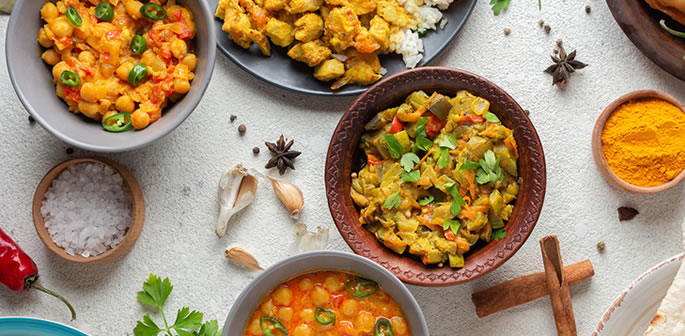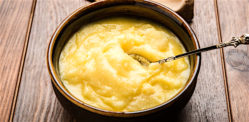curcumin can alleviate symptoms of arthritis
Indian food is known to be rich and sometimes unhealthy but there are a number of health benefits in some aspects.
Many dishes can be high in saturated fats and calories which can be a problem for those monitoring their health.
However, there are a number of health benefits associated with Indian food, specifically with the ingredients used.
For example, chickpeas are a great source of fibre, zinc, folate and protein.
But they are known to have long-term health benefits.
We look at some of the health benefits of adding Indian food to your diet.
Reduce Inflammation

Indian food is known for its diversity of flavours, colours and aromas but it is the spices that are known to have anti-inflammatory properties.
Turmeric is known to be a potent anti-inflammatory agent. The active ingredient in turmeric is curcumin, which has been extensively studied for its anti-inflammatory properties.
Curcumin works by inhibiting the activity of pro-inflammatory enzymes and cytokines, which contribute to the development of chronic inflammation.
Studies have shown that curcumin can alleviate symptoms of arthritis, inflammatory bowel disease and other chronic inflammatory conditions.
Another anti-inflammatory spice is ginger. It contains compounds called gingerols and shogaols that have been shown to reduce inflammation in the body.
Studies have shown that ginger can ease pain and stiffness in people with osteoarthritis and reduce inflammation in people with ulcerative colitis.
Garlic contains compounds such as allicin and sulfur, which have been shown to reduce inflammation by inhibiting the activity of pro-inflammatory cytokines.
There are also a variety of vegetables, fruits and whole grains, which are rich in antioxidants and fibre.
Antioxidants help reduce inflammation by neutralising free radicals, which are molecules that can cause oxidative stress and inflammation in the body.
Meanwhile, fibre helps promotes the growth of beneficial gut bacteria, which play a crucial role in immune system function and inflammation.
Controls Blood Sugar Levels
Although some Indian foods are high in refined carbohydrates, which can cause blood sugar levels to spike, there are a variety of ingredients that can help regulate blood sugar levels.
Many dishes are made with a variety of spices, whole grains, legumes, and vegetables, which can help stabilise blood sugar levels and improve insulin sensitivity.
Whole Grains
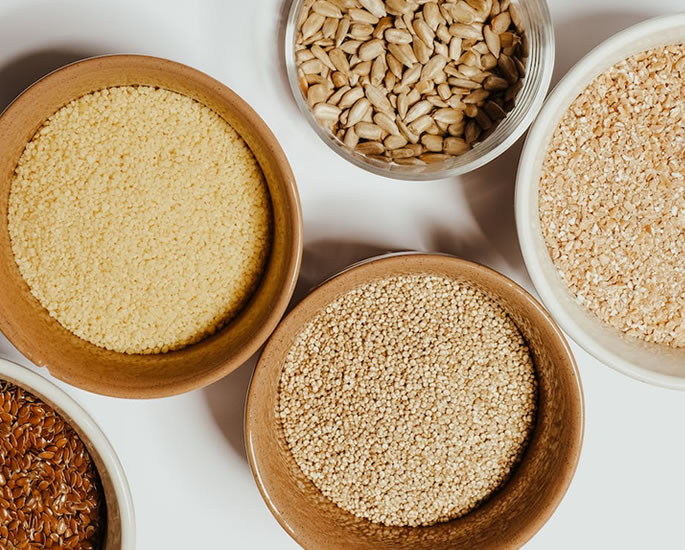
Indian cuisine includes a variety of whole grains such as brown rice, quinoa, barley and millet, which are high in fibre and complex carbohydrates.
These whole grains are digested slowly, which means that they release sugar into the bloodstream gradually, preventing spikes in blood sugar levels.
Pulses
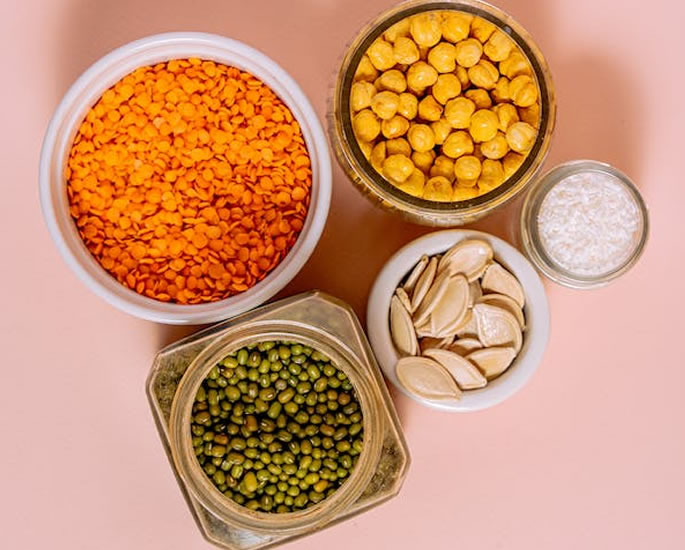
Pulses such as lentils, chickpeas and beans are high in protein and fibre.
The high fibre content in pulses helps to slow down the absorption of sugar in the bloodstream, preventing spikes in blood sugar levels.
Spices
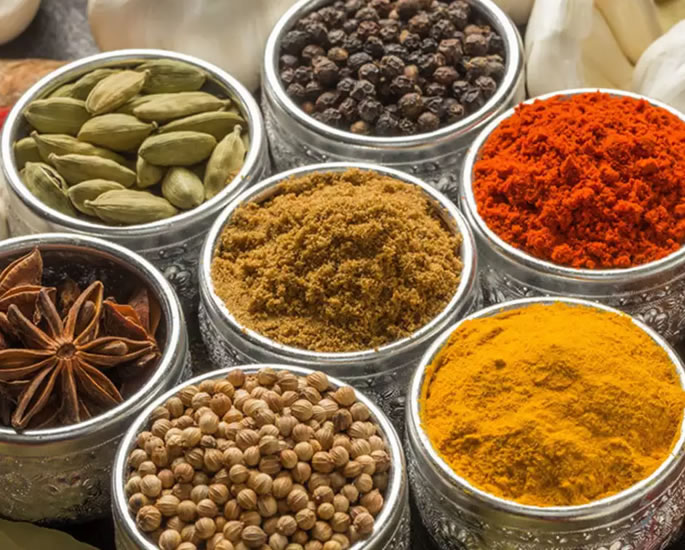
Popular spices used in Indian cuisine include turmeric and fenugreek. Both are known to have been shown to have blood sugar-lowering properties.
For example, turmeric can help to improve glucose metabolism and reduce inflammation in the body.
Vegetables

Vegetables make up a large part of Indian cuisine and some of the most popular ones include bitter gourd, okra and aubergine.
These vegetables are low in calories and high in fibre, which can help to regulate blood sugar levels and improve insulin sensitivity.
Nuts & Seeds
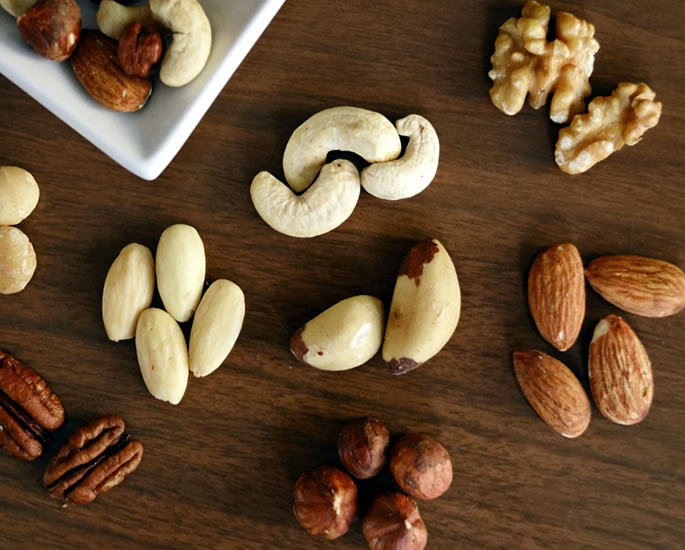
Almonds, cashews and chia seeds are all used in Indian cuisine. They are high in healthy fats and fibre.
These foods can help to slow down the absorption of sugar in the bloodstream, preventing spikes in blood sugar levels.
Whole grains, pulses, spices, vegetables, nuts and seeds are all part of a healthy Indian diet that can help to prevent spikes in blood sugar levels and improve insulin sensitivity.
By incorporating these foods into your diet, you can help to control blood sugar levels and reduce the risk of developing type 2 diabetes.
Improves Bone Strength
Indian cuisine offers several options that are rich in nutrients essential for maintaining healthy bones.
Calcium-rich Foods
Calcium is a key nutrient for bone health. Indian cuisine offers a range of calcium-rich foods such as paneer, leafy greens and fortified foods like tofu and cereals.
Including these foods in your diet can help meet your daily calcium needs and improve bone strength.
Vitamin D
Vitamin D is essential for calcium absorption and bone health.
Indian cuisine offers several foods rich in vitamin D, such as fatty fish, egg yolks and mushrooms.
Exposure to sunlight is also a natural source of vitamin D.
Herbs & Spices
Herbs and spices are known for their anti-inflammatory properties, which can help prevent bone loss, and Indian food is packed with them.
For example, turmeric is known to have anti-inflammatory and antioxidant properties that can improve bone health.
Protein-rich Foods
Protein is essential for bone health, as it provides the building blocks necessary for bone formation.
Indian cuisine offers several vegetarian and non-vegetarian protein sources such as lentils, beans, chicken and fish.
Promotes Better Brain Health

Indian food is packed with herbs and spices and it has been shown that consumption of these herbs and spices can promote better brain health.
Turmeric contains curcumin which has anti-inflammatory properties.
Curcumin has also been shown to improve brain function and reduce the risk of age-related brain diseases such as Alzheimer’s.
Studies have shown that cumin can improve memory and cognitive function. It also contains antioxidants that can protect the brain from damage caused by free radicals.
In a 2015 study, participants were randomly assigned a placebo or a capsule containing 150mg of cumin extract daily for 28 days.
The results showed that the cumin group had significantly improved cognitive function compared to the placebo group.
Specifically, they had better attention, memory and executive function.
Almonds and walnuts contain omega 3 fatty acids and vitamin E, which have been shown to improve brain function and reduce the risk of cognitive decline.
While these ingredients can help promote better brain health, engaging in regular physical exercise, getting enough sleep and managing stress can also help to improve cognitive function and reduce the risk of age-related brain diseases.
Reduces Risk of Cancer
Certain ingredients used in Indian cuisine are known to reduce the risk of cancer.
Pulses such as lentils contain phytochemicals such as phytica acid and saponins which may prevent the reproduction of cancerous cells.
Leafy vegetable dishes such as saag are beneficial because the likes of spinach and kale contain folates and carotenoids.
Folates help protect the DNA, which is known as the starting point of changes that lead to cancer. Meanwhile, carotenoids can inhibit the development of cancer cells.
Curcumin in turmeric has been found to be effective in slowing the growth of lung, prostate and breast cancer cells.
Use turmeric as a spice for its colour and flavour as well as its cancer-fighting benefits.
Tomato-based curries might be more beneficial than you think as tomatoes have several cancer-fighting properties.
Tomatoes derive their bright red colour from lycopene which is an antioxidant known for its ability to protect cells from damage.
Tomatoes can also protect your skin from cancer by absorbing the UV light.
Garlic is an essential ingredient in Indian cuisine and when it comes to health benefits, it contains an active component called allicin that can kill cancer cells.
Health Tips
Like other cuisines, there are aspects of Indian food that are not as healthy as we would like.
When enjoying Indian food, healthier options to consider include tomato-based curries and vegetable dishes.
Fish is also a healthier option than chicken or lamb.
Where possible, avoid using ghee. Instead, cook with vegetable oil.
Cream-based curries such as korma should only be enjoyed occasionally because they are high in fat.
Similarly, peshwari naan is also high in fat and sugar.
When eating rice, choose plain boiled rice instead of pilau which has added oil. An even healthier option is brown rice, which is higher in fibre.
Tandoori dishes will reduce the consumption of fat and calories as they are typically cooked in a tandoor. This cooking method allows the excess fat to drip off.
Indian food has a number of health benefits thanks to the ingredients used in dishes.
Some can help with day-to-day life while others can reduce the risk of developing more serious health issues.
But to maximise a healthy lifestyle, diet must be coupled with regular exercise.




















































